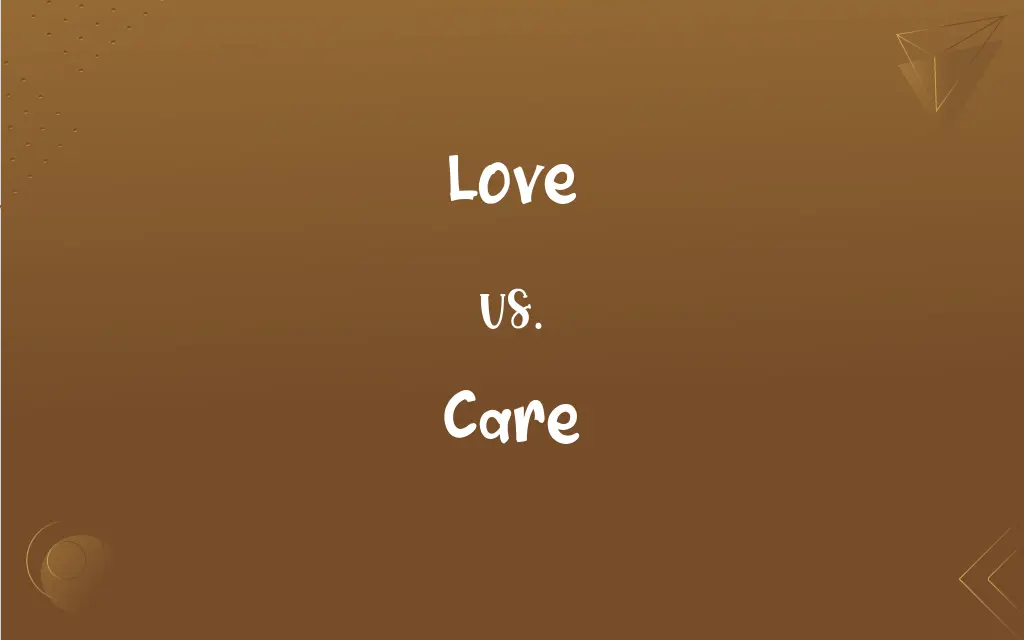Love vs. Care: What's the Difference?
Edited by Aimie Carlson || By Harlon Moss || Updated on October 13, 2023
Love often entails a deep affection and personal attachment, while care involves concern and provision of what is necessary for health and protection.

Key Differences
Love is an emotion that often transcends boundaries, capturing hearts and souls in its profound essence. Care, on the other hand, tends to be a deliberate action, guided by a sense of duty or moral obligation. Both can exist independently but often intertwine in beautiful, complex ways.
Love can motivate numerous actions and emotions, causing joy, pain, passion, and sometimes even irrationality. Care doesn't necessarily provoke such a vast range of emotions and is often associated with a calm, steady dedication to the well-being of others, without the rollercoaster of feelings that love can bring.
Love is frequently unconditional, expecting nothing in return, and is often linked with desires, physical attraction, and deep emotional connections. Care, meanwhile, can be more conditional and might not involve deep emotional attachment, focusing more on ensuring well-being and security.
The depth of love might sometimes cloud judgment, potentially leading one to make decisions that aren’t always logical or rational. Whereas care generally involves a level of thoughtfulness and consideration, ensuring practical and supportive actions are provided.
Love can be expressed towards persons, objects, and abstract concepts and isn’t confined to interpersonal relationships. Care generally relates more to beings (people, animals) or entities that can have well-being, showcasing a conscious intent to provide and protect.
ADVERTISEMENT
Comparison Chart
Emotional Depth
Can be profound and deep
May lack deep emotional connection
Expectation
Often unconditional
Can be conditional
Focus
Emotion and attachment
Providing and protecting
Rationality
Can be irrational
Generally rational and thoughtful
Application
Broad (objects, concepts)
Generally towards beings
ADVERTISEMENT
Love and Care Definitions
Love
Love is a profound emotional attachment toward someone or something.
People often express love for their partners through kind gestures.
Care
Care implies a sense of responsibility toward something or someone.
Parents naturally care for their children’s safety and happiness.
Love
Love is an intense feeling of affection and care towards another person.
Her love for her children is evident in her dedication to them.
Care
Care also refers to maintaining something.
You need to care for the plants by watering them regularly.
Love
Love can mean a great interest and pleasure in something.
His love for painting allowed him to create beautiful artworks.
Care
Care means to feel concern or interest.
They showed how much they care by consistently checking on their friend’s well-being.
Love
Love can also be used to express a kind-hearted and selfless act.
Their love for the community drove them to volunteer weekly.
Care
Care is providing physical or emotional support.
In their sickness, they found comfort in the care of their loved ones.
Love
Love can refer to a feeling of strong attraction and emotional bond.
Their love was evident in the way they looked at each other.
Care
Care is to provide for and look after someone or something.
Nurses often care for patients in a variety of healthcare settings.
Love
A strong feeling of affection and concern toward another person, as that arising from kinship or close friendship.
Care
A concerned or troubled state of mind, as that arising from serious responsibility; worry.
Love
A strong feeling of affection and concern for another person accompanied by sexual attraction.
Care
An object or source of worry, attention, or solicitude
The many cares of a working parent.
FAQs
Can love be unconditional?
Yes, love can be given without expecting anything in return.
Can love exist without care?
It's debatable, as some argue true love always involves some level of care.
Can care be completely devoid of love?
Yes, one can care for others without necessarily loving them.
What is love in one word?
Attachment.
Does care imply responsibility?
Often, as caring usually involves taking responsibility for another’s well-being.
Can love be directed towards non-living things?
Yes, people can love objects, activities, or concepts.
Can care be selective, provided to some and not to others?
Yes, care can be selective and might be directed towards specific individuals or entities based on various factors.
Is love always romantic?
No, love can also be platonic, familial, or self-love.
Is care always evident through actions?
Generally, yes, as care often involves tangible actions to support others.
Can care be seen as a duty or obligation sometimes?
Yes, individuals might care for others out of a sense of duty or obligation, such as in professional or familial roles.
Can care be professional, detached from personal emotions?
Absolutely, professionals in various fields provide care without personal emotional involvement, such as healthcare workers or caretakers.
Can care lead to burnout?
Yes, excessive care, especially without self-care, can lead to burnout.
Does love always require reciprocity for it to sustain?
No, love can be sustained from one side; however, reciprocity often strengthens and maintains it.
Can love be destructive or harmful at times?
Unfortunately, yes, sometimes love can lead to unhealthy dynamics or behaviors if it becomes obsessive or possessive.
Is love a static emotion, or can it evolve?
Love can absolutely evolve, transforming in nature and intensity as relationships and individuals change.
Can love be platonic and still be deep and meaningful?
Absolutely, platonic love can be just as profound and significant as romantic love.
Is it possible to care for someone but dislike them?
Yes, it is possible to care about someone's well-being without having affectionate feelings towards them.
Can love change forms over time within the same relationship?
Yes, love can evolve and manifest differently throughout the course of a relationship.
Is care more about physical well-being?
Not exclusively; care can be about emotional, mental, or physical well-being.
Is care always a conscious and deliberate action?
Generally, yes; care often involves conscious decisions and actions to support or assist others.
About Author
Written by
Harlon MossHarlon is a seasoned quality moderator and accomplished content writer for Difference Wiki. An alumnus of the prestigious University of California, he earned his degree in Computer Science. Leveraging his academic background, Harlon brings a meticulous and informed perspective to his work, ensuring content accuracy and excellence.
Edited by
Aimie CarlsonAimie Carlson, holding a master's degree in English literature, is a fervent English language enthusiast. She lends her writing talents to Difference Wiki, a prominent website that specializes in comparisons, offering readers insightful analyses that both captivate and inform.































































